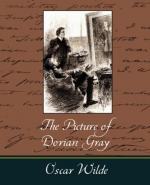“Just turn your head a little more to the right, Dorian, like a good boy,” said Hallward, deep in his work, and conscious only that a look had come into the lad’s face that he had never seen there before.
“And yet,” continued Lord Henry, in his low, musical voice, and with that graceful wave of the hand that was always so characteristic of him, and that he had even in his Eton days, “I believe that if one man were to live his life out fully and completely, were to give form to every feeling, expression to every thought, reality to every dream,—I believe that the world would gain such a fresh impulse of joy that we would forget all the maladies of mediaevalism, and return to the Hellenic ideal,— to something finer, richer, than the Hellenic ideal, it may be. But the bravest man among us is afraid of himself. The mutilation of the savage has its tragic survival in the self-denial that mars our lives. We are punished for our refusals. Every impulse that we strive to strangle broods in the mind, and poisons us. The body sins once, and has done with its sin, for action is a mode of purification. Nothing remains then but the recollection of a pleasure, or the luxury of a regret. The only way to get rid of a temptation is to yield to it. Resist it, and your soul grows sick with longing for the things it has forbidden to itself, with desire for what its monstrous laws have made monstrous and unlawful. It has been said that the great events of the world take place in the brain. It is in the brain, and the brain only, that the great sins of the world take place also. You, Mr. Gray, you yourself, with your rose-red youth and your rose-white boyhood, you have had passions that have made you afraid, thoughts that have filled you with terror, day-dreams and sleeping dreams whose mere memory might stain your cheek with shame—”
“Stop!” murmured Dorian Gray, “stop! you bewilder me. I don’t know what to say. There is some answer to you, but I cannot find it. Don’t speak. Let me think, or, rather, let me try not to think.”
For nearly ten minutes he stood there motionless, with parted lips, and eyes strangely bright. He was dimly conscious that entirely fresh impulses were at work within him, and they seemed to him to have come really from himself. The few words that Basil’s friend had said to him—words spoken by chance, no doubt, and with wilful paradox in them—had yet touched some secret chord, that had never been touched before, but that he felt was now vibrating and throbbing to curious pulses.
Music had stirred him like that. Music had troubled him many times. But music was not articulate. It was not a new world, but rather a new chaos, that it created in us. Words! Mere words! How terrible they were! How clear, and vivid, and cruel! One could not escape from them. And yet what a subtle magic there was in them! [15] They seemed to be able to give a plastic form to formless things, and to have a music of their own as sweet as that of viol or of lute. Mere words! Was there anything so real as words?




